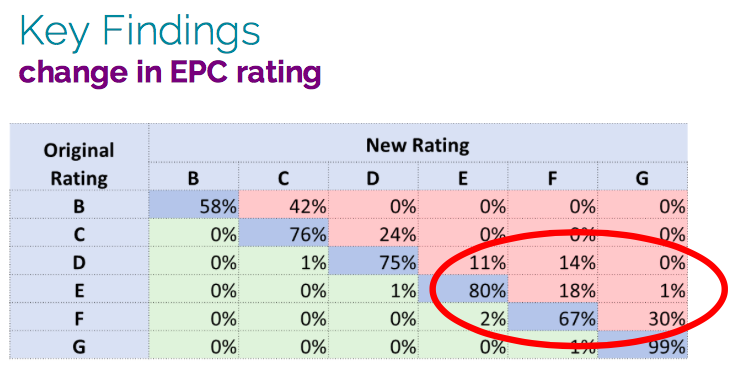 A third of commercial buildings thought to meet minimum energy efficiency requirements so that landlords may continue to let them may actually fall foul of incoming legislation, modelling of 3,500 “well managed” buildings suggests.
A third of commercial buildings thought to meet minimum energy efficiency requirements so that landlords may continue to let them may actually fall foul of incoming legislation, modelling of 3,500 “well managed” buildings suggests.
Arbnco (previously CO2 Estates) analysed the data via the latest version of its EPC platform, which contains over 3,500 EPC models all produced within the last five years. It found that 33% of buildings previously carrying a D or E rating, sufficient to meet Minimum Energy Efficiency Standards (MEES), which come into force in April 2018, dropped into an F or G rating.
The new laws mean public and private sector non-domestic landlords may not grant a tenancy to new or existing tenants if their property has an EPC rating of band F or G. From 2023, landlords will not be able to lease buildings with an energy efficiency rating lower than E.
While landlords can self-certify exemptions from the scheme as of next month, Arbnco says its modelling serves as a warning that many building energy ratings may be inaccurate, and that more commercial buildings than thought could theoretically be taken off the market under the new laws.
The firm pointed out that its modelling looked at “well managed” building stock, suggesting that if even this stock was not up to scratch, many more properties could fare worse under proper scrutiny.
“With MEES just over a year away, landlords, property managers and their advisors need to be acting now to ensure buildings do not pose a risk. The analysis was conducted on well-managed building stock, so there is potential to observe a greater percentage drop in EPC ratings in poorer performing portfolios,” said Simon West, co-founder of Arbnco.
“Not everyone involved in the management of a building has a background in engineering, but the impacts of poor energy performance and forthcoming MEES legislation will affect all, and informed decisions need to be made.”
Under MEES, landlords can face fines of up to £160,000 per property, as well as leasing restrictions.
Download the firm’s findings here.
Related stories:
Government publishes guidance for landlords on minimum energy efficiency laws
Lawyers outline how landlords can avoid falling foul of minimum energy efficiency standards
Landlords ‘unable to rent energy inefficient buildings from 2018’
Landlords ‘don’t trust energy efficiency solutions providers’
Recovering utilities costs from commercial tenants
Free report: 2017 energy and water risks and opportunities for businesses
Click here to see if you qualify for a free subscription to the print magazine, or to renew.
Follow us at @EnergystMedia. For regular bulletins, sign up for the free newsletter.





There’s no excuse for not meeting the minimum standards, but how will the legislation be policed and enforced – experience of previous such well-meaning “prescriptive limit” types of legislation show that next to no resource goes into enforcement.
Absolutely spot on. It is clear that if a landlord fails to obtain an EPC in the first place – and only a minority currently do – on past experience there is no likelihood that any English local authority will proceed against them